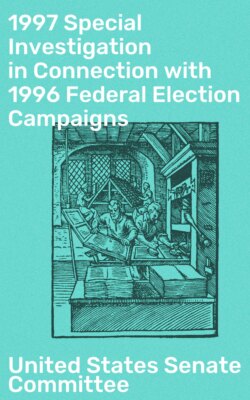Читать книгу 1997 Special Investigation in Connection with 1996 Federal Election Campaigns - United States Senate Committee - Страница 17
На сайте Литреса книга снята с продажи.
Charlie Trie
ОглавлениеTable of Contents
Trie first met the President in the late 1970's when he owned and operated a Chinese restaurant in Little Rock. After Clinton’s election in 1992, Trie sold his restaurant and opened Daihatsu International Trading Company in Washington, D.C. Soon thereafter, Trie and his wife contributed large sums to the DNC, and by 1994 he had become a DNC “Managing Trustee”—a title reserved for the highest level of party contributor. From 1994 to 1996, Trie contributed or raised approximately $645,000 for the DNC. In 1994, he contributed $100,000 to the DNC while earning only approximately $30,000 as president of Daihatsu. Nor could his firm Daihatsu have made up the difference: throughout this period, it never made any profit.
In reality, most of Trie’s money came from his Asian business partner, Ng Lap Seng, a hotel tycoon in Macao with reputed links to organized crime who advises the Chinese government.4 Ng transferred approximately $1.4 million to Trie from 1994 to 1996, with many of these transfers arriving through the Bank of China. Sometimes Trie contributed Ng’s money directly to the DNC in his own name. In other instances, he laundered donations through other Asian-Americans. Two of these “straw donors” made donations to the DNC so that Ng could attend a White House function. Accordingly, they donated a total of $25,000 to the DNC and were reimbursed with money from Ng’s account.
In addition to being a major fundraiser and close friend of the President, Trie visited the White House 31 times in 1994 and 1995 alone. Intriguingly, Ng, who had no ties to the President except through Trie, also visited the White House 10 times between June 1994 and October 1996. In one of the more egregious examples of its dilatory document production, however, the White House did not reveal Ng’s still-unexplained visits until just hours after the conclusion of the Committee’s public hearing on the activities of Trie and Ng.5
Trie’s fundraising efforts won him numerous White House favors, including a Presidential appointment to the Commission on U.S. Pacific Trade and Investment Policy—an act requiring a new Executive Order to expand the size of the Commission. In February 1996, assisted by a $50,000 donation from his business partner Ernest G. Green, Trie arranged admission to a White House coffee for Wang Jun, a Chinese arms dealer and advisor to the Chinese government. Despite his connections to a major Chinese armaments firm whose plans to smuggle automatic weapons into the U.S. the Customs Service even then was investigating, Wang was not vetted by the National Security Council (“NSC”) and was admitted to the White House only on the strength of his relationship with Trie and Green.
In March 1996, Trie wrote to the President on how to handle U.S.-China relations, which were then tense. This letter was faxed to the White House on the same day that Trie delivered almost $500,000 to the Presidential Legal Expense Trust (“PLET”). The Committee has been unable to determine whether Trie wrote this letter on his own or on behalf of foreign interests. Trie received a reply from the President prepared by NSC staff and personally reviewed by National Security Advisor Tony Lake.
Trie also set about to help the President and First Lady defray the considerable personal legal expenses they had accrued in fending off previous scandals. To this end, Trie raised in excess of $700,000 from a controversial Buddhist sect devoted to a woman named Ching Hai, and conveyed this money to the PLET.
The PLET, however, became suspicious about the source of Trie’s funds. With White House approval, the PLET’s executive director, Michael Cardozo, hired an investigative firm that determined that the money had been coerced from or laundered through members of the Ching Hai sect. Nevertheless, soon after, Trie sat next to the President at the head table of a $5,000 per person fundraising dinner.
By June 1996, the PLET decided to return Trie’s donations. Rather than publicly reporting his contributions under its regular practice, the PLET hid the fact that Trie had ever given money to it. Moreover, the White House knew and approved of this decision. Despite Ickes’ and Lindsey’s knowledge of Trie’s suspicious fundraising, neither warned the DNC. As a result, while the PLET returned his donations, Trie’s illegal contributions to the DNC continued; Trie delivered $110,000 to the DNC in August 1996 in honor of the President’s 50th birthday.
Both the DNC and the White House claimed complete surprise that Huang and Trie raised substantial amounts of foreign money. It strains credulity, however, to suggest that these men could surreptitiously raise over $2.2 million for the DNC—much of it from foreign donors at major DNC events the President attended—without anyone suspecting the truth.
